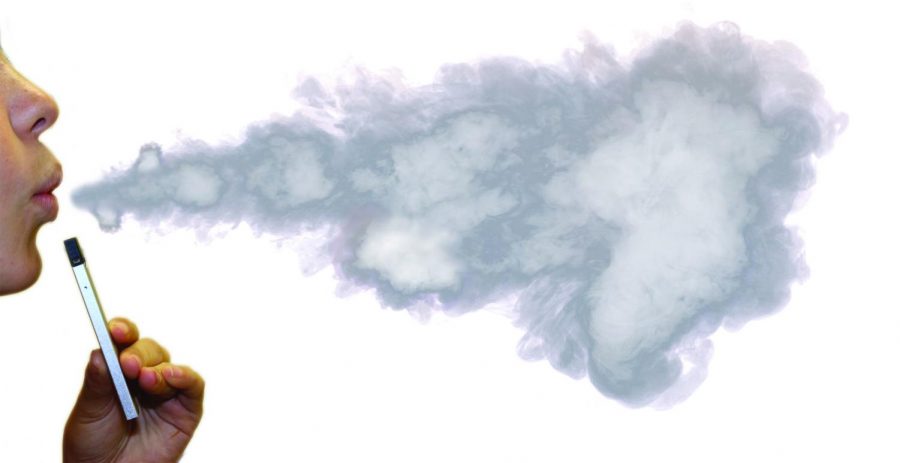Schools sue e-cigarette companies
Districts seek monetary compensation, changes to company practices
Over 450 school districts across the nation are engaging in an ongoing multidistrict litigation against electronic cigarette companies, including JUUL Labs Inc., Altria Group Inc. and R.J. Reynolds Tobacco Co.
Ares Dalianis, co-chair of the Education Practice Group and a partner with Franczek P.C. Law Firm, said in a phone interview, “It’s undeniable that a lot of money has been spent in fighting and addressing the vaping epidemic.”
School districts have expended money on education and student discipline dealing with vaping, such as installing vape detectors, Dalianis said.
Associate Superintendent R.J. Gravel said in a phone interview that Glenbrook High School District #225 has installed vape detectors at both high schools and at Glenbrook Off Campus.
Each detector is, depending on how many are bought at a time, approximately $800 in addition to an annual cost of about $100 per detector, Gravel said.
According to Dalianis, one goal of the litigation is for school districts to be reimbursed for future costs and costs they have incurred and cannot recoup anywhere else.
The other major objective is to obtain injunctive relief, which prevents the defendants from engaging in certain actions like marketing to children or designing their products to make them look attractive, like a USB stick, Dalianis said.
Neela Satyanarayan, program coordinator for the Cook County Department of Public Health’s Tobacco Prevention and Control Program, said in a phone interview that almost all vaping or e-cigarette products sold contain nicotine.
“Use of these products is not healthy and it’s unsafe,” said Satyanarayan. “It can cause not only addiction to these products, but potentially addiction to other things in the future. It can also potentially lead to anxiety, [and it potentially] amplifies feelings of depression.
“Nicotine can [also] harm adolescent brain development,” Satyanarayan said.
According to Dalianis, school districts began filing cases in the latter half of 2019, and Illinois districts began filing their suits in the second half of 2020 into 2021.
The cases are consolidated in front of one federal judge in the Northern District of California, who presides over all the cases, Dalianis said.
JUUL Labs Inc., Altria Group Inc. and R.J. Reynolds Tobacco Co. did not respond to email and phone message requests for comment.
Approximately 25 school districts in Illinois, mainly in the Chicago area, have joined the litigation, including Evanston Township High School District #202, New Trier Township High School District #203 and Barrington Community Unit School District #220.
According to Gravel, District #225 considered joining the lawsuit. As of Nov. 3, the district is not participating in the litigation.
“In terms of why we considered upfront possibly joining the suit was [that] there is a potential that there could be revenue that we can use to further enhance, expand or maintain our existing programs that seek to … keep students making right choices and not traveling down the abuse or drug use route.
“[For] why we did not move forward, it was the lack of clarity in terms of how much [both local and California] attorneys were going to be compensated [and] how much burden the school district might have,” Gravel said.
This burden includes time to prepare information for the case and other responsibilities that may result from joining the lawsuit, Gravel said.
According to Dalianis, the window of time for school districts to join the litigation closes around mid-November.
The first school district case is scheduled for trial in March of 2022, Dalianis said.
The state of North Carolina brought a case against JUUL Labs, which was settled earlier this year, Dalianis said.
“That case is viewed as a positive sign for the school districts’ cases because the defendants agreed to a very substantial … settlement in order to avoid going to trial in North Carolina,” Dalianis said.
Youth vaping is a public health and public policy issue, Dalianis said.
“This litigation holds the potential to enjoin, or stop, these companies from doing what they’re doing,” Dalianis said.


